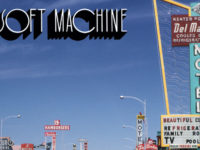Soft Works – the quartet of Hugh Hopper, John Marshall, Elton Dean and Allan Holdsworth – existed for only two short years, recording one studio album. Abracadabra, released in 2002, showcased their gifts and collective spirit. Now, nearly two decades later, a companion piece has joined it. Abracadabra In Osaka is a memento of a band (and three musicians) that left us too soon.
To understand the excitement in some quarters over this release, it’s helpful to go back more than 50 years. The storied history of Soft Machine encompassed dizzying shifts in personnel, style, even band names. Soft Machine first appeared as a trippy psychedelic rock band in 1966, then weathered – or perhaps caused – tectonic shifts in the music scene over the next couple decades. All despite never selling more than a few thousand recordings.
No two albums by the group featured the same personnel, a tradition that continued in various offshoots over the years. First was Matching Mole, headed by original drummer/vocalist Robert Wyatt. Many others followed, most incorporating “Soft” in the name: Soft Heap, Soft Head, Soft Mountain, Soft Ware. When alums Elton Dean (sax and keyboards), John Marshall (drums), Hugh Hopper (bass) and Allan Holdsworth (guitar) convened in 2002, they dubbed the band Soft Works, and issued Abracadabra.
Within a couple years, Holdsworth opted out and was replaced by guitarist John Etheridge – as had happened in the ’70s. When Dean passed away, he was replaced by Theo Travis. After Hopper’s death, another former Soft, Roy Babbington, joined the fray once more. After issuing five albums under the sobriquet Soft Machine Legacy, the quartet opted to once again call the band Soft Machine.
Whatever the name, the various permutations have straddled genres from rock to pop and points between. They’ve rearranged classic Soft Machine tunes to showcase whoever was in the band at that time, incorporating jazzy riffs, meandering melodies and freeform blowing. The results have never been less than interesting.
That’s certainly the case with the new live document of the Soft Works band. Though Holdsworth, Dean and Hopper are sadly no longer with us, Abracadabra In Osaka from the MoonJune label (named for a Robert Wyatt composition from Soft Machine’s third album) is a celebration of the deft work by these four masterful musicians.
It is taken from one of the band’s two tours of Japan. British guitarist Mark Wingfield, another staple of the esoteric MoonJune label, was tasked with cleaning up tapes from the soundboard that had already been mixed into stereo. The result is both a testament to Wingfield’s studio prowess as well as a final document from one of the great Canterbury bands.
Several tracks date back to vintage Soft Machine albums, including “Calyx” by Phil Miller and “Has Riff,” by Dean and longtime Soft Mike Ratledge. Elton Dean and Hugh Hopper open the former in unison before Hopper fades into the rhythmic background alongside Marshall’s busy drums. “Has Riff” again pairs the two, matching Dean with Hopper’s sinister bass, with Marshall’s menacing cymbal taps warning of danger to come.
At the other end of the musical spectrum, “Alphrazalian” features some of the band’s prettiest playing. John Marshall’s shimmering cymbal work and Allan Holdsworth’s atmospheric guitar offer Dean’s sax some counterpoint. His plaintive sax takes center stage on “Baker’s Treat.” Disc one concludes with “Kings & Queens,” a Hopper tune originally found on Fourth back in 1971. It sounds just fine in the present day, thank you.
Disc two opens with the title tune, this time stretched out to nearly 11-and-a-half minutes. The Softs never lacked for imagination and ways to broaden and lengthen their music. On “Madam Vintage Suite,” Holdsworth alternates between his high-speed legato runs and the atmospheric backgrounds he should be as well-known for.
“First Train” is one of the quote “jazziest” tunes, the rhythm section setting the loping beat and Dean providing the background on electric piano, while Holdsworth solos over the top. That phrase refers to both the placement of the guitar and his style. He then provides the background for Dean’s altogether more gentle solo excursion. It concludes with Hopper’s “Facelift,” going all the way back to 1970. The original featured a mix of live concert recordings and various effects; Soft Works’ version is more straightforward, though Dean’s squeals and runs could scare off less intrepid listeners.
All told, Abracadabra In Osaka is a worthy addition to the Soft Machine legacy (lower case l) and a testament to the prowess of some master musicians.
- Jon Anderson, Reza Khan, CSNY + Others: Ross Boissoneau’s Best of 2024 - December 30, 2024
- Tower of Power, Jennifer Hudson, Ben Folds + Others: 2024’s Seasonal Sounds - November 25, 2024
- Dave Bainbridge of Downes Braide Association: The Albums That Shaped My Career - October 9, 2024



